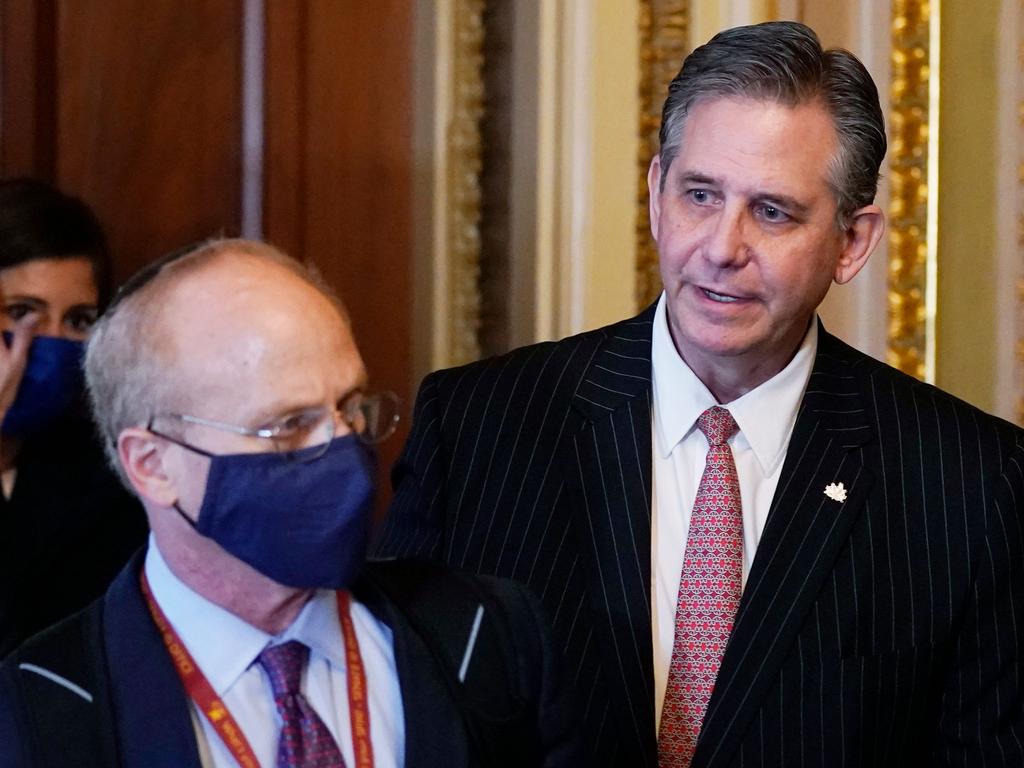Trump’s impeachment trial a bear trap for Republicans
Trump won’t be convicted but his party’s senators are damned if they support him and damned if they don’t. They want him gone but they don’t want to be held responsible for what comes next.
In Jonathan Lynn’s 1992 comedy My Cousin Vinny, Joe Pesci plays a small-claims personal injury lawyer from Brooklyn with no trial experience suddenly thrust into an Alabama courtroom to defend a young family member and his friend wrongly charged with murder.
The hapless and garrulous lawyer has no clue about court procedures, legal dress or anything else for that matter and the accused seem doomed. But Vinny is nothing if not persistent and his unorthodox courtroom manner eventually produces crucial evidentiary breakthroughs that lead to the family members’ acquittal.
Donald Trump is a well-known aficionado of popular culture and no stranger to unorthodox legal strategies so it’s possible that in mounting his defence this week in his second impeachment trial, he was invoking the spirit of Vinny Gambini.
Just days before the trial began in the US Senate, Trump abruptly parted company with much of the legal team he had originally hired to defend him against the charge of incitement to insurrection. His wrath had been fired, it seems, by disagreements over the strategy they planned to pursue, as well as by the personal tensions that attend almost any interactions with the notoriously prickly former president.
The man chosen at short notice to play the lead role of a lawyer defending Trump on the Senate floor was Bruce Castor, a 59-year-old former prosecutor from Pennsylvania who had apparently never met Trump but who, like Vinny in the movie, gamely stepped up when summoned.
It didn’t go well.
After Democrats from the House of Representatives had presented an emotionally taut indictment of the former president for his role in instigating the January 6 riot that engulfed Capitol Hill, Castor baffled the assembled senators with a folksy disquisition at great length that ranged from childhood recollections of listening to vinyl recordings of famous senators to musings about the internal politics of Nebraska. Trump, it’s reported, was not impressed.
Fortunately for Castor and the president, unlike typical courtroom dramas, the outcome of this one isn’t in any doubt. Conviction requires a two-thirds majority in the Senate: 67 votes. Given that it is split 50-50 between Democrats and Republicans it would take 17 members of the president’s own party to vote for conviction and that is as likely to happen as an Alabama jury siding with a defence lawyer from New York.
Democrats know this too. While the case against Trump is strong his opponents are mostly hoping for political opportunity from the impeachment exercise. Their refusal to call a single witness and their imposition of a rushed timetable over just two weeks make a mockery of any notion that this is a genuine trial.
Their aim is not the explicit one of Trump’s conviction and his disqualification from office. It is to drive deeper the wedge that cleaves the Republican Party.
Republicans are on the horns of an especially gnarly dilemma. Vote to convict Trump and they will face the wrath of a party base that still passionately supports the former president. Two members of Congress who have already expressed their support for Trump’s conviction – Liz Cheney, a congresswoman from Wyoming, and Ben Sasse, a senator from Nebraska – have both been censured by their state Republican parties for daring to suggest Trump committed impeachable offences.
But vote to acquit Trump and they risk forever being tied to the events of January 6, which a large majority of Americans view as a violent effort to overthrow constitutional government.
While a handful of Republicans seem set to vote to convict, the rest hope to navigate their dilemma by walking a fine procedural and legalistic line.

Rather than defend Trump’s behaviour directly, they argue the trial itself is unconstitutional because the former president has already left office and therefore can’t be impeached. But this rests on dubious legal grounds and so Republicans are falling back on a narrow and precise defence against the impeachment charge: that what Trump did in his speech on January 6 was not incitement but no more than the usual sort of hyperbolic rhetoric that all politicians use.
It’s true that, in addition to deploying much inflammatory oratory, Trump called on his supporters in that speech to “peacefully and patriotically” protest against the certification of the election in Congress that day. It’s also true that the legal standard for incitement to violence is an exceptionally difficult one to meet and he probably didn’t meet it.
But it’s also unavoidably true, as the Democratic prosecutors have argued effectively this week, that Trump’s insistence since election day that his supporters had been cheated created the conditions for the attempt to overturn the results.
This is the deeper reality that Republicans can’t avoid by their narrowly drawn legal strategy: Trump and a large proportion of their own supporters continue to insist the election was illegitimate. Their larger problem is that a significant proportion of their own voters subscribe to a position that in important ways rejects the constitutional order.
Republicans in Congress are playing a dangerous game. They want Trump gone but they don’t want to be held responsible. In voting to acquit and free him to run for office again, they are hoping fervently he will never exercise that freedom. But there’s nothing in Trump’s record to suggest he will view an acquittal as anything other than a vindication.
The Times








To join the conversation, please log in. Don't have an account? Register
Join the conversation, you are commenting as Logout